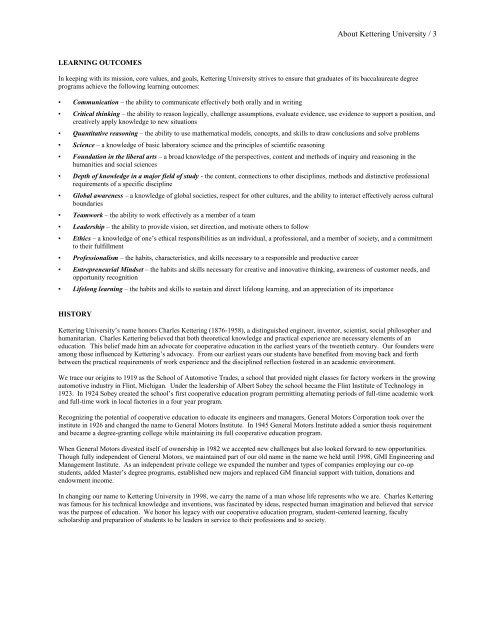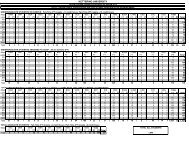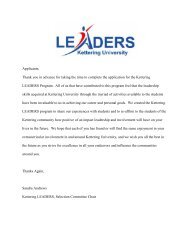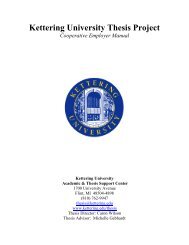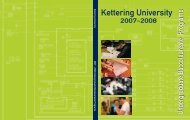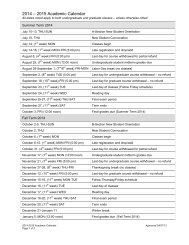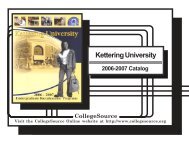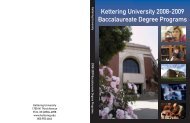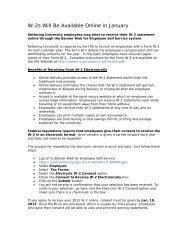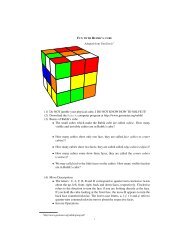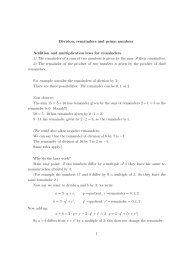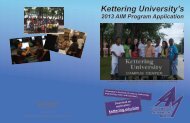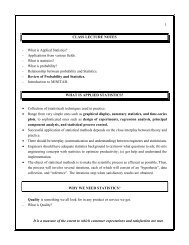2012-2013 Undergraduate Catalog.pdf - Kettering University
2012-2013 Undergraduate Catalog.pdf - Kettering University
2012-2013 Undergraduate Catalog.pdf - Kettering University
Create successful ePaper yourself
Turn your PDF publications into a flip-book with our unique Google optimized e-Paper software.
About <strong>Kettering</strong> <strong>University</strong> / 3<br />
LEARNING OUTCOMES<br />
In keeping with its mission, core values, and goals, <strong>Kettering</strong> <strong>University</strong> strives to ensure that graduates of its baccalaureate degree<br />
programs achieve the following learning outcomes:<br />
• Communication – the ability to communicate effectively both orally and in writing<br />
• Critical thinking – the ability to reason logically, challenge assumptions, evaluate evidence, use evidence to support a position, and<br />
creatively apply knowledge to new situations<br />
• Quantitative reasoning – the ability to use mathematical models, concepts, and skills to draw conclusions and solve problems<br />
• Science – a knowledge of basic laboratory science and the principles of scientific reasoning<br />
• Foundation in the liberal arts – a broad knowledge of the perspectives, content and methods of inquiry and reasoning in the<br />
humanities and social sciences<br />
• Depth of knowledge in a major field of study - the content, connections to other disciplines, methods and distinctive professional<br />
requirements of a specific discipline<br />
• Global awareness – a knowledge of global societies, respect for other cultures, and the ability to interact effectively across cultural<br />
boundaries<br />
• Teamwork – the ability to work effectively as a member of a team<br />
• Leadership – the ability to provide vision, set direction, and motivate others to follow<br />
• Ethics – a knowledge of one‘s ethical responsibilities as an individual, a professional, and a member of society, and a commitment<br />
to their fulfillment<br />
• Professionalism – the habits, characteristics, and skills necessary to a responsible and productive career<br />
• Entrepreneurial Mindset – the habits and skills necessary for creative and innovative thinking, awareness of customer needs, and<br />
opportunity recognition<br />
• Lifelong learning – the habits and skills to sustain and direct lifelong learning, and an appreciation of its importance<br />
HISTORY<br />
<strong>Kettering</strong> <strong>University</strong>‘s name honors Charles <strong>Kettering</strong> (1876-1958), a distinguished engineer, inventor, scientist, social philosopher and<br />
humanitarian. Charles <strong>Kettering</strong> believed that both theoretical knowledge and practical experience are necessary elements of an<br />
education. This belief made him an advocate for cooperative education in the earliest years of the twentieth century. Our founders were<br />
among those influenced by <strong>Kettering</strong>‘s advocacy. From our earliest years our students have benefited from moving back and forth<br />
between the practical requirements of work experience and the disciplined reflection fostered in an academic environment.<br />
We trace our origins to 1919 as the School of Automotive Trades, a school that provided night classes for factory workers in the growing<br />
automotive industry in Flint, Michigan. Under the leadership of Albert Sobey the school became the Flint Institute of Technology in<br />
1923. In 1924 Sobey created the school‘s first cooperative education program permitting alternating periods of full-time academic work<br />
and full-time work in local factories in a four year program.<br />
Recognizing the potential of cooperative education to educate its engineers and managers, General Motors Corporation took over the<br />
institute in 1926 and changed the name to General Motors Institute. In 1945 General Motors Institute added a senior thesis requirement<br />
and became a degree-granting college while maintaining its full cooperative education program.<br />
When General Motors divested itself of ownership in 1982 we accepted new challenges but also looked forward to new opportunities.<br />
Though fully independent of General Motors, we maintained part of our old name in the name we held until 1998, GMI Engineering and<br />
Management Institute. As an independent private college we expanded the number and types of companies employing our co-op<br />
students, added Master‘s degree programs, established new majors and replaced GM financial support with tuition, donations and<br />
endowment income.<br />
In changing our name to <strong>Kettering</strong> <strong>University</strong> in 1998, we carry the name of a man whose life represents who we are. Charles <strong>Kettering</strong><br />
was famous for his technical knowledge and inventions, was fascinated by ideas, respected human imagination and believed that service<br />
was the purpose of education. We honor his legacy with our cooperative education program, student-centered learning, faculty<br />
scholarship and preparation of students to be leaders in service to their professions and to society.


